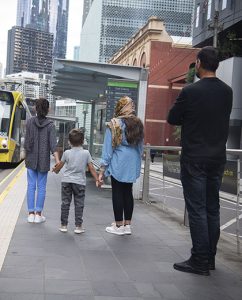Afghan evacuee families being reunited
Dozens of Afghan families are being reunited in Australia following months of separation caused by the return of the Taliban regime in their homeland.
In recent weeks the wives, children and extended relatives of Afghans who worked with, of for, the Australian government have begun to arrive.
In many cases, Afghans who had direct connections to Australia were the only ones able to get out as the Taliban took control of the Kabul – either via the Airlift or overland through Pakistan.
Now, as Pakistan has issued more visas and Australia has waived many of the normal identity requirements, family members are able to travel to join Afghan evacuees already in Australia.
Afghan evacuee ‘Shafiq’, who worked with Australian forces between 2009 and 2014 and also with USAid as an interpreter and linguist, was recently united with his wife, son and seven daughters.
 “Because I had worked with the Australian government and the US government that was a threat to me and my family. The Taliban were saying that ‘if you work for foreign countries, we will kill you’,” said Shafiq, whose identity is not being revealed to protect family members still in Afghanistan.
“Because I had worked with the Australian government and the US government that was a threat to me and my family. The Taliban were saying that ‘if you work for foreign countries, we will kill you’,” said Shafiq, whose identity is not being revealed to protect family members still in Afghanistan.
Shafiq was granted a 449 visa by the Australian government and told to go to Kabul’s airport. But like thousands of others, he was unable to get into the airport and was left behind when the airlift ended on August 25.
After three months hiding out in Eastern Afghanistan and moving often to stay out of the clutches of the Taliban, Shafiq and a brother were able to get into Pakistan and then on a flight to Australia, arriving on November 19.
“My brother and I got visas for Pakistan but the rest of the family had no travel documents. After three more months we still didn’t have passports for everyone,” Shafiq said.
“Then the Australian High Commission in Islamabad sped up the process saying that my family could cross the Pakistan border with just their ID cards, which they did. Shafiq’s family arrived in Melbourne last week.
“I am grateful to the High Commission. They were very kind throughout the process. They did a brilliant job,” Shafiq said.
“My kids can study and have a bright future. In Afghanistan my seven daughters had no chance of an education. Now they will have great opportunities,” Shafiq said.
‘Talib’, who worked as an interpreter with the Australian army in 2009 and 2010, has also been reunited with his family after months apart.
As the only member of his family with a passport, Talib was able to get on flight to Qatar and then to Australia arriving on December 8.
His family were able to get passports when a provincial passport office reopened in February. They were first in line and obtained the documents needed to flee the country.
After Talib sent scans of the passport to the immigration department, his family was asked to travel to the Pakistan border near Jalalabad.
“The Pakistan government had agreed to let people in without visas or passports. At the Pakistan side of the border, the Australian High Commission met my family and took them to Islamabad,” said Talib, whose real name is not being revealed to protect family members still in Afghanistan.
“They were there for five or six days and were given accommodation and looked after. The High Commission then arranged flights to Darwin,” he said.
“I’m really happy because now we have all been evacuated from a war area in Afghanistan to Australia. I am so grateful and appreciative to the government of Australia. My family can now start a new life in a new country,’ Talib said.
Afghan photojournalist Omar Shobani has seen his family reunited after they were hurriedly evacuated from Kabul in August.
As a photographer for a western agency and often working alongside western military forces, Omar became a target for the brutal fundamentalist Taliban militias.
While Omar, his wife and six children were flown out of Kabul when the city fell, his wife and three children were forced to return to Kabul because of problems with their documents.
“They had to wait for three months for a Pakistan visa. Eventually they were able to cross the border into Pakistan again and then come to Australia,” Omar said.
Omar and three of his children arrived in Australia in December. His wife and three other kids arrived last month.
“I can’t explain what it feels like to have them all here and safe after so many months. I’m very relieved,” he said.
Omar said he hoped life in Australia would deliver a bright future for his children and a new career for himself.
“We grateful to be here. My kids have the chance of a good education and a good life. I have a disabled son and I hope to get care for him,” Omar said.
“I hope to work in Australia. I’m not sure what I will do – I have no documents or equipment but I hope to continue my job as a photojournalist,” he said.












